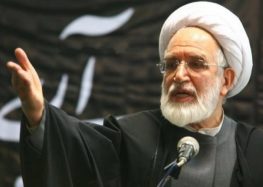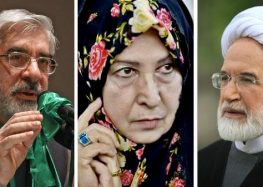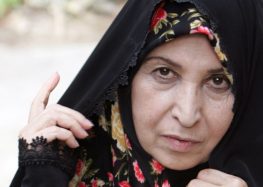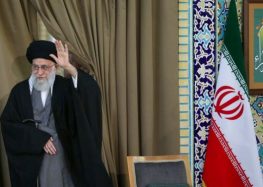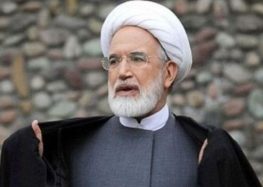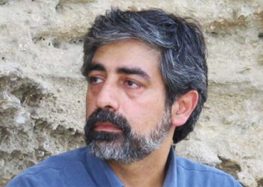MPs Criticize Friday Prayer Leader for Calling Female Rouhani Supporters “Prostitutes”
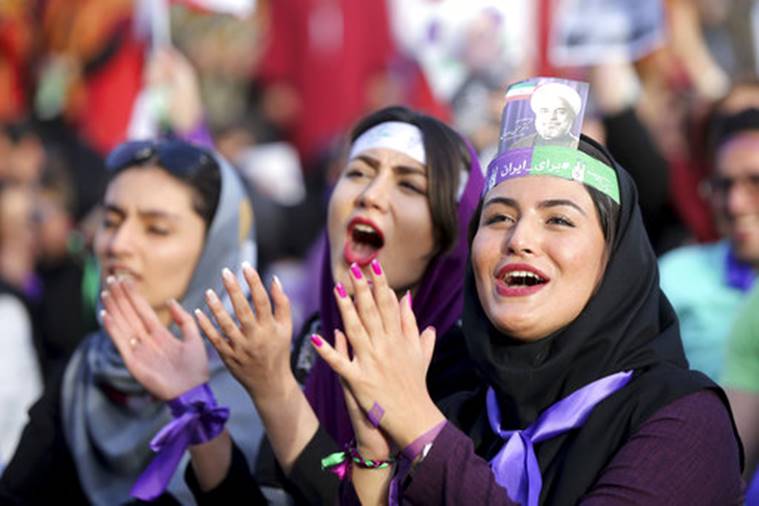
The Friday prayer leader of the city of Saveh in central Iran is facing backlash from reformist members of Parliament after he called female supporters of President Hassan Rouhani “prostitutes.”
The MPs have demanded an explanation from Hojatoleslam Ebrahim Hosseini, who could be taken to court for slandering the women.
“Those who wore white shawls (during the presidential election campaign) and carried the green and purple symbols of sedition are a reminder of the prostitutes who carried the purple flag outside brothels in pagan times,” said Hosseini in a sermon on June 2, 2017.
The white shawl is being worn by women in Iran as a symbol of opposition to the compulsory hijab.
Purple was the official campaign color of centrist President Rouhani, who won the May 19 presidential election with a resounding victory over his three conservative rivals.
Green was the campaign color of Mir Hossein Mousavi, a presidential candidate from the 2009 election who has been under extrajudicial house arrest since 2011 for challenging the vote count that year and leading the mass protests that came to be known as the Green Movement.
News media outlets in Iran have been instructed not to raise the issue of the house arrests. The 2009 protests meanwhile continue to be referred to as the “sedition” by authorities in Iran.
“From a theological standpoint, (the Friday prayer leader’s) slanderous statements are punishable under Islamic law,” wrote Hojatoleslam Ahmad Mazani, a reformist MP from Tehran, on his Telegram channel on June 4.
“Which Islamic, ethical or civil law gave you the right to accuse millions of Iranians of prostitution during the holy occasion of Friday prayer?” he added.
According to Article 257 of Iran’s Islamic Penal Code, “When a person, in the same statement, commits qazf [false accusation of sexual offenses] against more than one person, each victim can separately make a complaint and ask for execution of the punishments if given by the court.”
“Those who wore green and purple symbols (during the elections) add up to about 24 million people who voted for Mr. Rouhani,” added Mazani. “Many of them are families of martyrs, veterans and soldiers who fought in the Sacred Defense [Iran-Iraq War, 1980-88].”
The reformist politician continued: “If you are worried about how women and girls are dressing, you can politely offer Islamic guidance and nicely ask them to carry out their religious duties. If you are worried about deviant political trends, you can express yourself with grace.”
The leader of the women’s parliamentary faction, reformist MP Parvaneh Salahshouri, meanwhile suggested that the attacks highlighted the conservatives’ frustration with women increasingly participating in politics.
“I can’t understand why women’s participation in politics has made some people so worried that they have to resort to rude insults?” said Salahshouri, according to a Shargh newspaper article published on June 6.
“Why are they smearing hardworking Iranian women in a manner undeserving of the clerical garb?” she added.
Tayebeh Siavoshi, a reformist MP from Tehran and the deputy chair of the women’s parliamentary faction, also told Shargh: “Iranian women do not deserve to be addressed with such vocabulary from the Friday prayer pulpits.”
Asked if the Friday prayer leader of Saveh could be held accountable for his comments in court, attorney Bahman Keshvarz told Shargh that women could opt to sue according to the Islamic Penal Code.
“Without a shadow of a doubt, the respectable gentleman who used the word ‘prostitute’ in public has the level of education to know exactly what he was saying, and that is in violation of Article 245,” he said.

